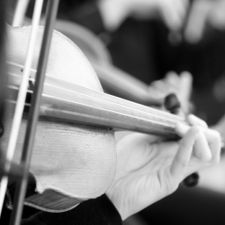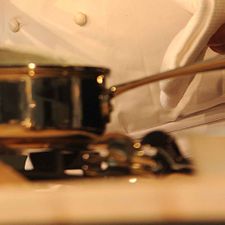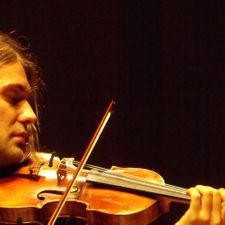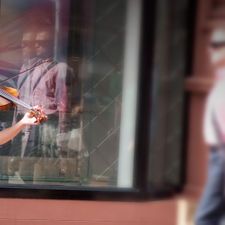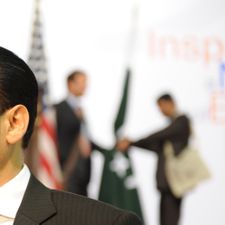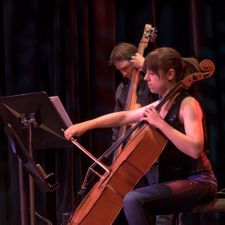Critical Writing
Articles grouped by theme and listed in reverse chronological order.
Creativity
Some reflections on transitioning out of being a "young composer"
What is the cut-off for being a “young composer?” Everyone defines that line a little differently, but I’m in my mid-30s, and in my case anyway, I certainly feel like I’ve moved onto the next thing. This transition is more a state of mind than… Read More »
Why Pastiche has Taken Over Music
The predominant ideology in composition today, across all genres, is rooted in pastiche. Most composers in the new music community aren’t consciously thinking about this, but we’re involved all the same. I mean, just look at the names: new complexity… Read More »
Delay...ay....ay....ay......ay patch
For the final blog post of my SoundMakers residency, I’m going to outline some of the technical details of how my SuperCollider patch for Longuement me sui tenus works. The functionality is the same for each of the four singers, with each having his… Read More »
Creating (and testing) a "prepared voice" patch in SuperCollider
Once I settled on the “prepared voice” concept for my SoundMakers commission, I had to figure out how to make it a musical reality. I had tested a few simple delay lines, but they weren’t great: I was either getting mechanical-sounding echoes or… Read More »
The well-prepared voice
I ended my last SoundMakers post by discussing how John Cage’s prepared piano studies influenced the approach I took to processing the voice in Longuement me sui tenus. Here, I want to go into a little more detail on how the electronics changed the… Read More »
Sampling, medieval France, love songs, John Cage
In the second of my SoundMakers Composer-in-Residence posts, I want to describe the piece I wrote (to be premiered spring 2015) and why I wrote what I did. Titled Longuement me sui tenus and scored for four vocal soloists (SATB) + electronics, the… Read More »
The score has got you by the short hairs
When you think about it, the concept of music notation is pretty weird. Imagine if Andy Warhol had received commissions not for paintings, but rather for paint-by-number templates, to be realized by each art interpreter on their own canvases. Of… Read More »
Most Artists Don’t Really Get Creativity
Too many artists embrace a mystical, new-agey approach to creativity that is completely counterproductive. There’s nothing magical about being creative; it’s just something you train your brain to do through practice. It’s part biology and part… Read More »
Working Weekends Makes You a Worse Composer
I saw a meme on Facebook a while ago, the one with the fake greeting card and custom text: “‘Yay! It’s the weekend,’ said no composer, ever.” Funny yes, but completely wrong. Bravado aside, if you consistently work “weekends” (meaning, you don’t take… Read More »
Experimentalism has a Biologically Hardwired Expiry Date
I read a great book recently, Why Nations Fail by Daron Acemoglu and James Robinson, which is essentially this fantastic global theory of poverty and progress that works flawlessly across all of history and the world. One of their key concepts is… Read More »
Letting Go of 20th-Century Historicism
Like most composers, I absorbed certain widely accepted musical axioms from my university studies, but they’ve never been entirely satisfying. As a consequence, I constantly search for better explanations, in the process hopefully becoming a better… Read More »
Improving Composer Education: Less Theory, More History
Recently I discovered the amazingly addictive new website Quora, where people ask questions on certain themes. After a basic setup, I was instantly directed to a very intriguing question for me: Why do people study music theory? I argued that music… Read More »
Experiment: Can I Completely Stop Choosing What Music I Listen To?
In a previous post, I discussed the difference in our reactions to music when we choose it (active selection) versus when someone else chooses it for us (passive selection). I claimed that the endless choice we experience thanks to Internet… Read More »
Searching vs. Finding
A recent article in Slate by Jan Swafford got me thinking about one of the major distinctions between information on the Internet and off the Internet. As I’ve been arguing for years, the way we interact with art has fundamentally changed. Swafford… Read More »
Is sleeping through a concert bad?
Recently I had a discussion with someone at a concert, about whether or not it was good to fall asleep during a performance. She said that, although she enjoyed the piece that had just been played, she was disappointed that it had been programmed so… Read More »
Outside of Outsider Music: How do we define the limits of what is “outside”?
The genre of outsider music is problematic in many respects. Unlike its art brut or naïve art cousins in the visual realm, it is difficult to come up with a specific categorization of outsiderness in music. Once we begin an attempt at such a… Read More »
Love, Free Will, and the Uselessness of Art
So today I read in the Globe and Mail that scientists are increasingly finding biological and genetic support for the age-old adages of love (Siri Agrell, “Sluts and Vermin”, The Globe and Mail, 26 Apr 2007, http://www.theglobeandmail.com/servlet… Read More »
High Art Music Without Cultural Highness: Reflections on the effects of twenty-first-century musical culture on the values and behaviour of avant-garde composers
Changes in Western attitudes toward high art music and developments in internet music technology in the twenty-first century have challenged the traditional values of avant-garde composers; they will therefore need to adapt accordingly. I examine… Read More »
Culture
Does classical music need fixing?
In this interview with the BBC’s Newshour, I discuss what classical music could do better when it comes to building audiences and attracting new listeners. Moderated by the BBC’s Tim Franks, the segment was inspired by an earlier interview with… Read More »
Is gentrification good for artists?
Living in San Francisco, you can’t avoid the anti-gentrification rants—and my fellow artists are some of the loudest participants. The Mission District, once a bohemian enclave, has become astronomically expensive and a playground for obnoxious Tech… Read More »
Classical concerts are great. Stop apologizing for them.
This week my Facebook feed was barraged with angstful hand-wringing over comments by Radiohead’s Jonny Greenwood, who told the BBC he finds classical concerts “off-putting.” Greenwood wasn’t dissing classical music—he performs it, after all—but he… Read More »
Composers Should Be More Like Chefs
This is the first post of my SoundMakers composer-in-residence position with Soundstreams. The residency is rooted in the idea of making the act of composing more visible, more tangible, more participatory. This is the main challenge for musical… Read More »
Classical isn’t dead and stop comparing it to pop already
Slate’s Mark Vanhoenacker published a statistics-laden (and admittedly sympathetic) “requiem” on the death of classical music last week. True, if you look at classical music through the lens of pop music, you might be forgiven for seeing a ER patient… Read More »
Accessibility is a Dead End
For decades now, classical music proponents have tried to make their organizations more accessible in order to attract audiences. This has always been a misguided and ineffective technique, and in fact I think it’s part of the reason we’ve seen… Read More »
Quiz: What Kind Of Composer Are You?
I’ve always been interested in what draws people to a specific vocation or another. Usually it’s some inherent personality trait, and composers share a lot them. But there are also some interesting differences. Here’s a tongue-and-cheek, Facebook… Read More »
Experimentalism has a Biologically Hardwired Expiry Date
I read a great book recently, Why Nations Fail by Daron Acemoglu and James Robinson, which is essentially this fantastic global theory of poverty and progress that works flawlessly across all of history and the world. One of their key concepts is… Read More »
Experiment: Can I Completely Stop Choosing What Music I Listen To?
In a previous post, I discussed the difference in our reactions to music when we choose it (active selection) versus when someone else chooses it for us (passive selection). I claimed that the endless choice we experience thanks to Internet… Read More »
Searching vs. Finding
A recent article in Slate by Jan Swafford got me thinking about one of the major distinctions between information on the Internet and off the Internet. As I’ve been arguing for years, the way we interact with art has fundamentally changed. Swafford… Read More »
The Fallacy of the Classics-of-the-Future Argument
Recently I went to a concert of new classical works, presented by an organization that typically specializes in the 18th- and 19th-century European classics. The host of the evening discussed the context of the new works, presumably to win over the… Read More »
Anti-Elitism versus Anti-Intellectualism: What the CBC is Doing Right and Wrong
There are necessary aspects to the current changes at the CBC, despite widespread protest from several camps, but there are also some major mistakes in the CBC’s approach. I am not a conspiracy theorist; I think the people responsible for the CBC… Read More »
Faust and Sub-Prime Mortgages
Recently I read both Goethe’s and Marlowe’s Faust plays—the Faust legend has been a major influence on many generations of composers and authors. I found them exceedingly dull, except that the Marlowe made me think about changing English syntax in… Read More »
Is sleeping through a concert bad?
Recently I had a discussion with someone at a concert, about whether or not it was good to fall asleep during a performance. She said that, although she enjoyed the piece that had just been played, she was disappointed that it had been programmed so… Read More »
Nostalgic Potentiality in Western Art Music Discourse: From Wagner to the Spectralists
There is surprisingly little musicological literature devoted to the subject of nostalgia, especially considering how widely it is used by musicologists in their writing. In this paper, I deal with the question of nostalgia as a discursive tool, and… Read More »
Ecomusicology, the Energy Crisis, and Changing Music
I’ve thought a lot lately about the effect that sound, and particularly music, has on our environment. This is what people frequently call Ecomusicology, though I’m not crazy about that term. Basically, do we have a right to make noise? How must it… Read More »
Music Has No Value
This is an issue I’ve been thinking about for a long time. Can we actually justify saying one kind of music is better than any other, or that one piece is better than another? I wrote a paper related to this issue recently for my degree… perhaps I’ll… Read More »
High Art Music Without Cultural Highness: Reflections on the effects of twenty-first-century musical culture on the values and behaviour of avant-garde composers
Changes in Western attitudes toward high art music and developments in internet music technology in the twenty-first century have challenged the traditional values of avant-garde composers; they will therefore need to adapt accordingly. I examine… Read More »
Economics
Are Unions Relevant to New Music?
Virtually all the new music musicians I know are left leaning and pro-labor, yet much of new music is non-unionized. Why is that? The AFM and other unions play a significant role in the realm of larger, more traditional music making—orchestras… Read More »
Would charging way more for classical albums boost sales?
Perhaps the classical music world has taken the entirely wrong approach to selling recordings; perhaps the reason they don’t turn a profit is because they’re significantly underpriced. Maybe we should be charging way more—like, three-figure prices… Read More »
Is gentrification good for artists?
Living in San Francisco, you can’t avoid the anti-gentrification rants—and my fellow artists are some of the loudest participants. The Mission District, once a bohemian enclave, has become astronomically expensive and a playground for obnoxious Tech… Read More »
No seriously, there's no such thing as arts entrepreneurship
Not everyone buys my claim that entrepreneurship is impossible in art, so I want to spill a few more pixels on this question. Whether or not you agree with me, you’ve got to admit that entrepreneurship hasn’t been a winning formula for artists as a… Read More »
Why Musicians Aren’t Paid More Fairly
Periodically I see these memes on Facebook: “If surgeons were paid like musicians…,” or “Hire a plumber for the same service and we’ll play for half that.” I sympathize, but this is the wrong approach. Moral finger-wagging has never won any argument… Read More »
Entrepreneurship Can’t Save Art
We live at a time that prizes entrepreneurship above all else, and this is bad for art. Not that entrepreneurs are out to destroy the arts, it’s just that artistic and business innovation are fundamentally antagonistic. Yes, entrepreneurs have… Read More »
Working for Free: Helpful or Harmful?
Ta-Nehisi Coates had an interesting article recently in the Atlantic about being asked, as an emerging journalist, to write for free. He got his leg up in the industry that way, and he makes the argument that there’s no ethical problem with asking… Read More »
The “Indie Rock”-ification of Chamber Music, Part 2: Culture
In Part 1, I talked about some of the economic implications of the indie model increasingly being adopted by classically trained chamber musicians. Here, I want to look at some of the cultural trends involved. While the general economic climate… Read More »
The “Indie Rock”-ification of Chamber Music, Part 1: Economics
I’ve noticed that every month or so I run across another article lauding an ambitious group of young chamber musicians for forging their own non-traditional path: playing in nightclubs and bars, using non-standard setups, playing amplified, writing… Read More »
Is There Such Thing As A Professional Composer?
I’ve been thoroughly enjoying Hans Abbing’s Why Are Artists Poor?, which formed an important source in my last two articles. Abbing is an economist and a visual artist, and he tackles the broad question of artist poverty from the perspective of both… Read More »
The Starving Artist: Full Time versus Part Time
A few weeks ago, a friend’s link to a rant about a rant about the Hype Machine, a music blog aggregator, got me thinking about the issue of whether it’s better to do art full time or part time. The short answer to that question, of course, has to do… Read More »
Economics vs. Art: Why a good fit has never existed
The economics of art is a perennial source of debate. Proponents of funding for the arts usually follow one of two arguments. The first is that art contributes intangibly to society by contributing a reason to live, as opposed to a way to live. The… Read More »
Education
How to set text to make your music more interesting
For the January installment of my SoundMakers residency, I want to write about setting words to music. The piece I wrote for SoundStreams posed some interesting text-setting challenges, given the fact that it’s in Old French and every word echoes for… Read More »
The well-prepared voice
I ended my last SoundMakers post by discussing how John Cage’s prepared piano studies influenced the approach I took to processing the voice in Longuement me sui tenus. Here, I want to go into a little more detail on how the electronics changed the… Read More »
Composition Lessons: The Dirty Projector’s “Police Story”
This is the second in my installment of mini-composition lessons based on non-classical music, this time on the topic of how to write for voice. Today, I’m going to take a look at “Police Story” by the Dirty Projectors, which I think is a fantastic… Read More »
A Machiavellian Guide to Becoming a Composer
I am currently reading the very interesting 48 Laws of Power, which is sort of an updated version of Machiavelli’s controversial work but with a modern perspective. I started thinking, becoming a world-renowned composer is a process not unlike… Read More »
Why Composers Should Drop Out of University (and What They Should Be Learning), Part 2
In the first part of this article, I talked about some of the problems with studying composition in academia, and I offered some alternative ways that composers might cultivate their craft more effectively (and probably less expensively too). Here, I… Read More »
Why Composers Should Drop Out of University (and What They Should Be Learning), Part 1
I’ve always said that I learned despite my education and not because of it, and after my master’s degree I decided to put my money where my mouth was and not pursue a PhD—much to my relief, the commissions and composing continued anyway. A few months… Read More »
Letting Go of 20th-Century Historicism
Like most composers, I absorbed certain widely accepted musical axioms from my university studies, but they’ve never been entirely satisfying. As a consequence, I constantly search for better explanations, in the process hopefully becoming a better… Read More »
What Composers Taught Me
I recently decided to try to encapsulate major lessons I learned from other composers’ music over the years into short one-liners. Sort of like the personality surveys that go around Facebook, but more about the musical personality of composers… Read More »
Improving Composer Education: Less Theory, More History
Recently I discovered the amazingly addictive new website Quora, where people ask questions on certain themes. After a basic setup, I was instantly directed to a very intriguing question for me: Why do people study music theory? I argued that music… Read More »
Fundraising
This is why your audience building fails
How do we increase the audience for new music? This is a never-ending debate, but virtually all of the standard answers assume that we need to be more inclusive, breaking down barriers for newcomers. From “people should be allowed to clap between… Read More »
Fixing American Arts Philanthropy: 3. Fund Existing Needs, Not Make-Work Projects
A common complaint among grant recipients, both in the arts and more generally, is that too many funders only support “new capacity”: they aren’t willing to chip in towards general operating expenses or other core activities that require ongoing… Read More »
Fixing American Arts Philanthropy: 2. Don't Sabotage Artistic Merit
This is the second of my pieces on straightforward, practical ways that institutional arts funders can be more effective. Here, I want to discuss the challenges of evaluating applications in terms of their artistic merit. Naturally, if you’re going… Read More »
Fixing American Arts Philanthropy: 1. Accept Fewer Applicants
There is never enough money in the arts. Equally problematic, the money we do have is not always used very efficiently. In the United States, most arts funding outside of ticket sales comes through philanthropy, whether by individual donors, private… Read More »
Why do the Rich Support the Arts?
Why exactly do rich people give money to the arts? If you think about it, the two are strange bedfellows: wealth usually begets conservatism while the arts tilt overwhelmingly liberal. Granted, there are certainly rich liberals, but I think there’s… Read More »
Crowdfunding vs. Philanthropy: Which is Better?
Some friends of mine were having an interesting Facebook discussion around Ellen Cushing’s recent article in the East Bay Express, about crowdfunding, philanthropy, and what the young and well-to-do of Silicon Valley mean for the future of the arts… Read More »
Marketing
This is why your audience building fails
How do we increase the audience for new music? This is a never-ending debate, but virtually all of the standard answers assume that we need to be more inclusive, breaking down barriers for newcomers. From “people should be allowed to clap between… Read More »
Does classical music need fixing?
In this interview with the BBC’s Newshour, I discuss what classical music could do better when it comes to building audiences and attracting new listeners. Moderated by the BBC’s Tim Franks, the segment was inspired by an earlier interview with… Read More »
Would charging way more for classical albums boost sales?
Perhaps the classical music world has taken the entirely wrong approach to selling recordings; perhaps the reason they don’t turn a profit is because they’re significantly underpriced. Maybe we should be charging way more—like, three-figure prices… Read More »
Classical concerts are great. Stop apologizing for them.
This week my Facebook feed was barraged with angstful hand-wringing over comments by Radiohead’s Jonny Greenwood, who told the BBC he finds classical concerts “off-putting.” Greenwood wasn’t dissing classical music—he performs it, after all—but he… Read More »
Classical isn’t dead and stop comparing it to pop already
Slate’s Mark Vanhoenacker published a statistics-laden (and admittedly sympathetic) “requiem” on the death of classical music last week. True, if you look at classical music through the lens of pop music, you might be forgiven for seeing a ER patient… Read More »
Accessibility is a Dead End
For decades now, classical music proponents have tried to make their organizations more accessible in order to attract audiences. This has always been a misguided and ineffective technique, and in fact I think it’s part of the reason we’ve seen… Read More »
How to build an audience when you loath marketing and self-promotion
Elissa Milne had an interesting article on her blog the other day about audience building, essentially advancing the claim that you build an audience for new music in the same way you build an audience for anything, be it an opera company or a rock… Read More »
A Machiavellian Guide to Becoming a Composer
I am currently reading the very interesting 48 Laws of Power, which is sort of an updated version of Machiavelli’s controversial work but with a modern perspective. I started thinking, becoming a world-renowned composer is a process not unlike… Read More »
The “Indie Rock”-ification of Chamber Music, Part 2: Culture
In Part 1, I talked about some of the economic implications of the indie model increasingly being adopted by classically trained chamber musicians. Here, I want to look at some of the cultural trends involved. While the general economic climate… Read More »
The “Indie Rock”-ification of Chamber Music, Part 1: Economics
I’ve noticed that every month or so I run across another article lauding an ambitious group of young chamber musicians for forging their own non-traditional path: playing in nightclubs and bars, using non-standard setups, playing amplified, writing… Read More »
Lend Me Your Ears
I just wanted to draw attention to colleague and friend Lisa Bielawa’s new blog, which I think is a good example of the kinds of things composers should be doing more to stay in the public eye. Lisa won the American Academy’s Rome Prize this year and… Read More »
New Music and Online Tools
For a genre that claims to be part of the cutting edge, the avant-garde/new classical music has been relatively slow to adopt online tools. I wonder about some of the ways we might improve the situation. As I’ve written about before, the major issue… Read More »
Reviews
Review: Programmatic works at SF Symphony: Avner Dorman (2010) vs. Paul Dukas (1897)
Like virtually all San Francisco Symphony concerts, I attended because there was a new work being played, in this case Israeli-American composer Avner Dorman’s Uriah: The Man The King Wanted Dead. A programmatic work based on a gruesome Old Testament… Read More »
Review: SFCMP 40th Anniversary Opening Concert: Points in Recent History
Rating: 4 out of 5 stars SFCMP kicked off its 40th season with a characteristically eclectic program that reminded me why the concert producer has been able to draw loyal subscribers for decades. The pieces on the program showed an appreciation for… Read More »
Concert Review: SFCMP's His Own Space of Freedom—Theatrically Engaging and Musically Diverse
Rating: 4.5 out of 5 stars The San Francisco Contemporary Music Players presented their final concert of the 2009/2010 season tonight, 26 Apr 2010, at the Herbst Theater in downtown San Francisco. On the program were pieces by Greek composer Manolis… Read More »
Christian Baldini Interview
Recently, I interviewed conductor/composer Christian Baldini for the San Francisco Contemporary Music Players. Christian is conducting a piece by French composer, Philippe Hurel for SFCMP’s upcoming concert on April 26. Baldini is an Argentine… Read More »
Review: sfSound's Small Packages: Ligeti's Chamber Concerto and lots and lots of Shorter Works
Rating: 3 stars out of 5 sfSound’s latest concert on Saturday 23 Jan 2010 was headlined by Ligeti’s well-known Chamber Concerto, which closed the concert, and was preceded by 10 shorter premières by up-and-comping Bay Area composers, mainly students… Read More »
Review: George Benjamin's Duet with the San Francisco Symphony
Rating: 3.5 stars out of 5 George Benjamin was the San Francisco Symphony’s composer-in-residence this month for this year’s installation of their Project San Francisco. Truthfully, I was not familiar with Benjamin’s work, but it came highly… Read More »
Dudamel, Glitz—and the importance of asking the right question
Jason Caslor has a post on his blog today referencing a New York Times article that muses about whether “glitz” or other marketing gimmicks are useful or hurtful for classical music. The musing is in reference to the effect that conductor Gustavo… Read More »











